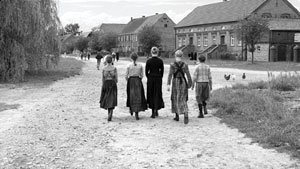 |
Michael Haneke, the 70-year-old Austrian filmmaker, made his first feature film when he was 47. Despite this slightly tardy start, as of this week, Haneke has become one of the very few to win the incredibly prestigious Palme d'Or at the Cannes Film Festival twice over. His first win was in 2009 for the film The White Ribbon, a powerful, disturbing, yet absolutely riveting film set in a small protestant German town just before the beginning of the First World War. His second win, this week, is for his film Amour, which follows an ailing elderly couple through their last days together.
In honour of this week's win, the Palme D'or being the prize in the world of serious cinema, I'd like to revisit The White Ribbon � one of the best, most masterful films I have seen in the last few decades, a tour de force that shows a film-maker at the pinnacle of his career.
Very soon into the beginning of this unforgettable film, the pastoral, idyllic German small town setting, shot in classic black and white, is disturbed by a malicious accident. The town doctor is riding home from seeing a patient when just in view of his house his horse trips over a wire that has been stretched out between two trees across the horse's path. Grievously injured, the doctor survives, the horse does not, and everyone is mystified and unnerved by the underhand nature of the crime.
The film develops slowly as a wide range of characters are introduced - the doctor's charming and innocent daughter; his helper, the children's nurse who has a retarded son (and who is also the widowed doctor's lover); the town's intractable, stern priest who exacts punishment on his long-suffering children at the slightest show of pride (or any other of the seven deadly sins); the Baron, who is a feudal lord of sorts in the town, and his beautiful, isolated Italian wife and toddler son.
As the characters develop, the narrative of the town's series of increasingly horrifying accidents is related to us through the voice of the young, patient, bespectacled school-teacher who is uniquely positioned to know and understand all the children in the town. It is his voice that brings all of the bizarre events into some perspective with its instinctive kindness.
When the Baron's son is whipped viciously and found hanging upside down, and the nurse's retarded son is also assaulted, to name a few of the chilling incidents that start to crop up in the slow, pastoral life of the town, everyone is unsettled, everything is off-kilter, and the townspeople are filled with increasing unease as they look towards each other, wondering at the culprit, or, as it becomes increasingly clear � culprits.
The film is hard to fit into any kind of genre; it is a drama, tinged with the quality of a thriller, full of events worthy of any successful horror film. Haneke paints his characters without sentimentality, but with understanding. His style is the closest cinematic equivalent to the novel's omniscient narrator; the difference here is that although by the end of the film we have a fairly certain knowledge of the perpetrators of these heinous crimes, we are still left wondering "Why?"
As with his other earlier and equally unnerving, excellent film Cache or Hidden, in English, no fingers are pointed. We are treated to a slow unfolding of a series of mysterious, deeply disturbing events, and are left to decide and wonder as the credits roll.
If you haven't seen The White Ribbon nor heard of Haneke, now would be the time to fix this gap in your knowledge of truly worthwhile cinema.
All DVDs reviewed in this column are available at: Music and Expression, Thamel, Phone # 014700092


